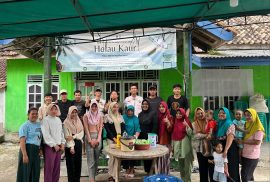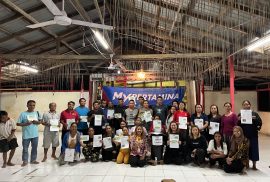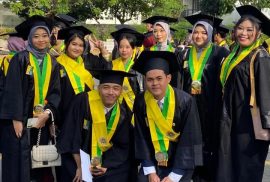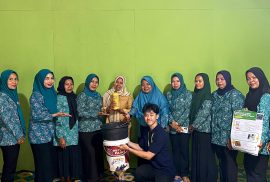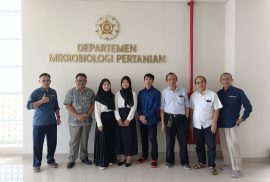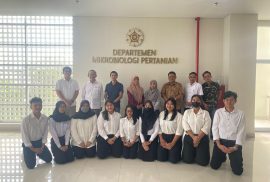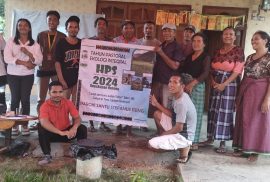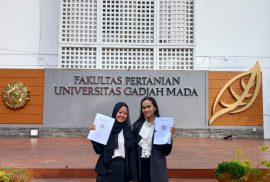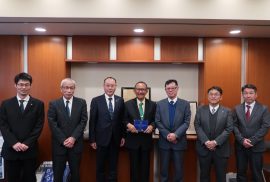Aloisius Andhika Mahesa Kanigara, a student of the Agricultural Microbiology Study Program from the 2021 cohort, has just completed his Community Service Program (KKN) in Linau Village, Maje Sub-district, Kaur Regency, Bengkulu Province. The KKN program took place from July 1 to August 19, 2024. Andhika and his team applied the knowledge they learned on campus through work programs designed to empower the local community. One of the programs carried out was the production of organic fertilizer using EM4, which is expected to help the people of Linau, most of whom work as fishermen, in improving soil quality and their agricultural yields.
SDG 8: PEKERJAAN LAYAK DAN PERTUMBUHAN EKONOMI
One of the Agricultural Microbiology students from the 2021 cohort, Erina Tika Febiyanti, who is commonly known as Erina, has just completed her Community Service-Learning and Community Empowerment Program (KKN-PPM) for the second period of 2024 in Dusun Badat Lama, Suruh Tembawang Village, Entikong Sub-district, Sanggau Regency, West Kalimantan. This KKN activity is a mandatory course that provides students with the opportunity to directly apply their field of study to help solve problems that arise in the community. According to Erina, the KKN program encourages students to broaden their perspectives, engage dynamically with the community to observe existing challenges, and solve those challenges by empowering local residents. Erina believes that the 50-day period for the community service program is not enough to fully resolve all the existing issues, but it is sufficient to initiate positive change, both for herself as a student and for the community to become more empowered in improving their well-being.
On August 28, 2024, 9 students from the Department of Agricultural Microbiology, Faculty of Agriculture, Universitas Gadjah Mada (UGM) officially completed their undergraduate studies. The nine graduates are Dewi Aryanti Anggraini (2019), Fatih Pangesti (2017), Agnes Dewantari (2017), Dhia Fildzah Farhana (2017), Putri Purwandari Caecilia (2017), Badran Sa’adi (2020), Jihan Mustika (2019), I Nyoman Aris Suardana (2020), Airin Dinanti Firdaus (2019). The event was attended by graduates, lecturers, families, and invited guests. Several outstanding students received special awards. One of them was the best student in the Department of Microbiology, Badran Sa’adi, who completed his studies in 3 years, 10 months, and 8 days, with the highest GPA of 3.73. Badran also conducted research on gene insertion into plasmids to create recombinant plasmids. This research is expected to contribute valuable knowledge in the field of Microbiology.
Located 1,420 km from the Special Region of Yogyakarta, a story of student dedication is etched in the land of Southeast Sulawesi. “Mai Te Wuna,” which means ‘come to Muna,’ Muna Regency not only offers beautiful natural scenery but also a community eager for knowledge. The 2024 Community Service and Empowerment Learning Program (KKN-PPM) of Gadjah Mada University was successfully held in Moolo Village and Lanobake Village, Batukara District, Muna Regency, Southeast Sulawesi Province. The KKN-PPM activities were carried out for 50 days, from July 1 to August 20. With the theme “Sustainable Community Empowerment Based on the Optimization of Local Commodities as an Effort to Increase the Transpolitan Mutiara Economy in Muna Regency,” the program involved 28 students from various majors, including Agricultural Microbiology.
On July 31, 2024, the Department of Agricultural Microbiology graduated two students, Wilda Asyrina Maris (2019) and Nur Afni Febriyani (2020). Wilda Asyrina Maris, often called Wilda, completed her studies in 4 years, 11 months, and 19 days, while Afni completed hers in 3 years, 10 months, and 17 days. This second graduation ceremony was held at the Microbiology Library, on the 4th floor of the Agrotropica Learning Center (AGLC) building. Wilda graduated with an “Excellent” (Sangat Memuaskan) distinction and Afni graduated with a “Cum Laude” (Pujian) distinction, with a GPA of 3.78.
The Agricultural Microbiology Department graduated nine students consisting of four students from the 2017 cohort, three students from the 2019 cohort, and two students from the 2020 cohort. The Agricultural Microbiology Study Program graduation ceremony was held in the Microbial Ecology Laboratory Room, Agrotropica Learning Center (AGLC) 4th Floor on Monday, July 22, 2024, attended by the Head of the Study Program, the Head of the Department, and the Thesis Supervisors. The graduation ceremony began with a speech by Prof. Ir. Irfan Dwidya Prijambada, M.Eng., Ph.D.
On Tuesday, April 23, 2024, the Department of Agricultural Microbiology held a graduation ceremony (judicium), with a total of five students graduating at the Microbiology Library, AGLC Building, 4th floor. These five students will attend the graduation ceremony in May 2024. Three students under the research guidance of Ir. Ngadiman, M.Si., Ph.D., are conducting research on the relationship between beneficial microorganisms and the growth of food crops and pathogen control. One student under the research guidance of Prof. Ir. Triwibowo Yuwono, Ph.D., is researching the formulation of osmotolerant rhizobacteria as biofertilizer, and one student under the research guidance of Prof. Ir. Irfan Dwidya Prijambada, M.Eng., Ph.D., is researching gold biooxidation by Chromobacterium violaceum. Three out of the five students successfully graduated with honors (Cumlaude) with a GPA above 3.70.
One of the Microbiology students from the 2020 cohort, Uways Irfany, commonly known as Uways, has just completed the Community Empowerment Learning Work Lecture (KKN-PPM) period IV of the year 2023/2024 in Paka Village, Satar Mese District, Manggarai Regency, East Nusa Tenggara. This KKN activity is one of the compulsory courses that provide opportunities for students to directly apply their discipline in helping to address community issues. According to Uways, the KKN program encourages students to step out of their comfort zone, observe the challenges faced by the community, and contribute effectively to solving these challenges together with students from other disciplines as well as with the local community. Although the 50-day service period may seem very short, Uways believes it is enough to initiate positive change not only for himself as a student but also for the community to become more empowered.
In the Judiciary Events of periods 1 and 2 in January 2024, the Department of Agricultural Microbiology graduated two students with the fastest study period, namely Roihana Ifa Kamalia (2020), commonly known as Ifa, with a study duration of 3 years 4 months 9 days, and Daniella Atteke Cantika Putri, commonly known as Cantika, with a study duration of 3 years 4 months 17 days. Ifa and Cantika started their microbiology studies during the COVID-19 pandemic with fully online lectures until the third semester. According to them, the strategy they applied to complete their studies on time was setting academic targets, especially for Field Work, Seminars, and Theses, along with strict time discipline. They always documented their academic targets, such as starting to draft fieldwork proposals during the 4th semester break so that they could conduct Field Work during the 5th-semester break in January 2023. They also conducted their fieldwork simultaneously with writing the final reports, allowing them to present their Field Work Seminar in March 2023.
On January 19, 2024, one of the professors from the Department of Agricultural Microbiology, Prof. Ir. Irfan Dwidya Prijambada, M.Eng., Ph.D., was awarded the title of Osaka University Global Alumni Fellow. He had previously been appointed as a Collaborative Professor at the same university since 2015 until now to teach about traditional fermentation. The title of Osaka University Global Alumni Fellow was directly conferred by the Executive Vice President of Osaka University, Manabu Tanaka. This title is bestowed upon Osaka University alumni who are active in the field of international networking. During the award ceremony, Tanaka expressed his hope that Prof. Irfan would continue to serve as a bridge between Osaka University and Indonesia in the development of research and strengthen relations among Osaka University alumni active in Indonesia.

